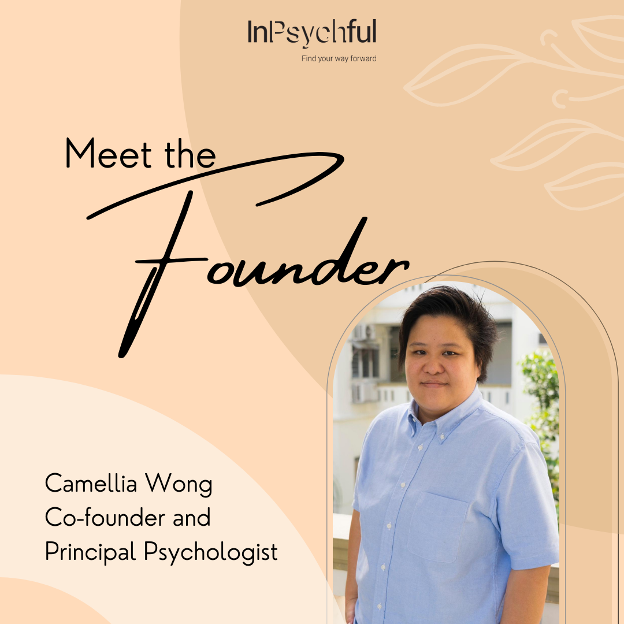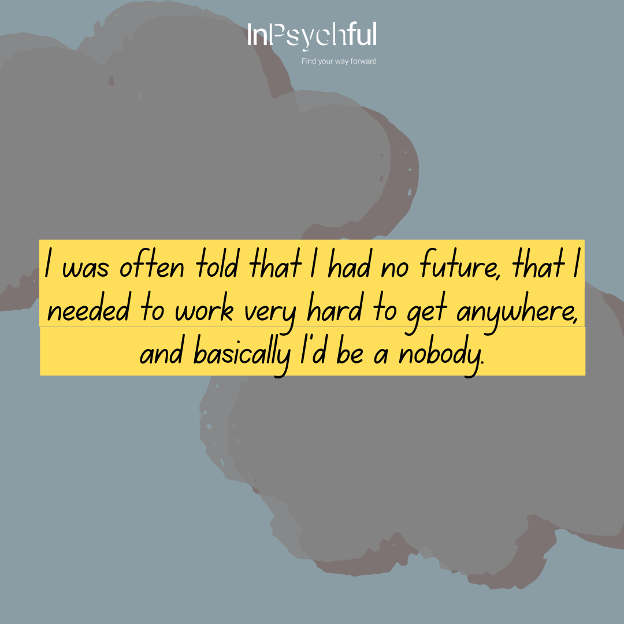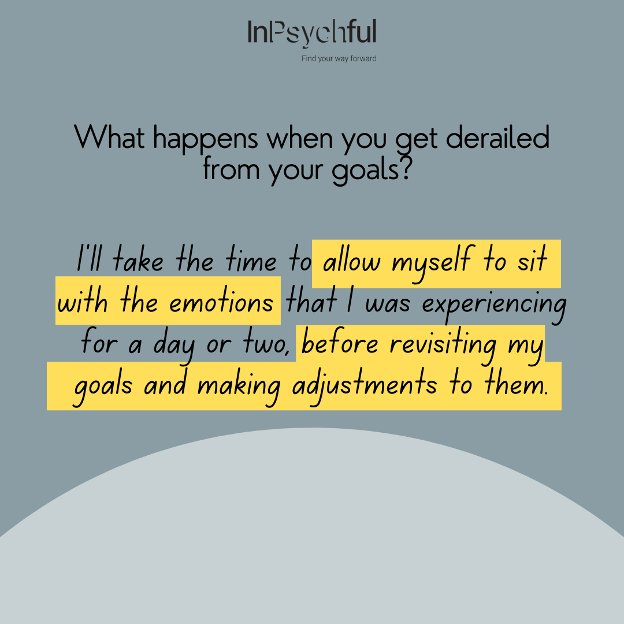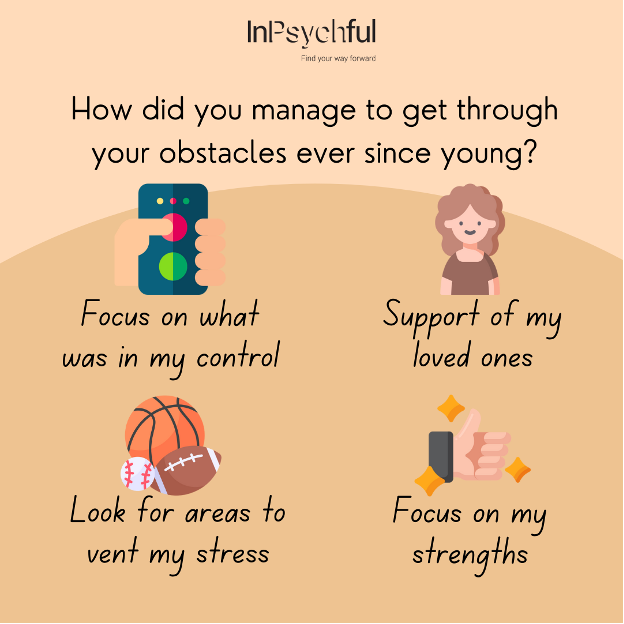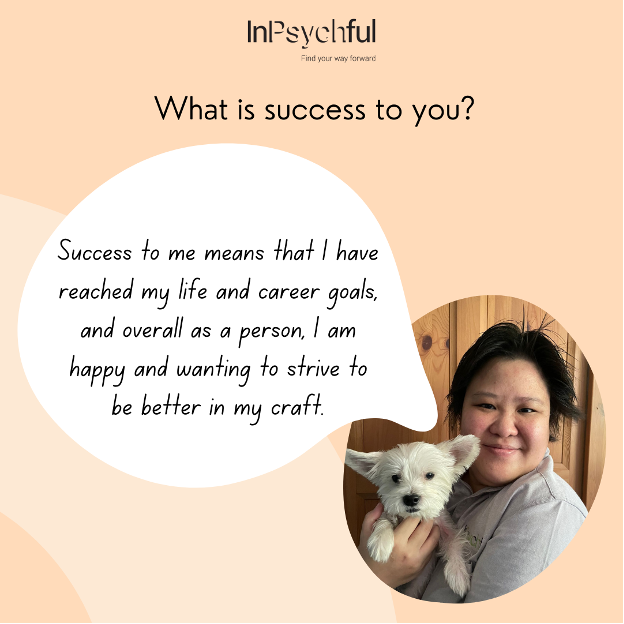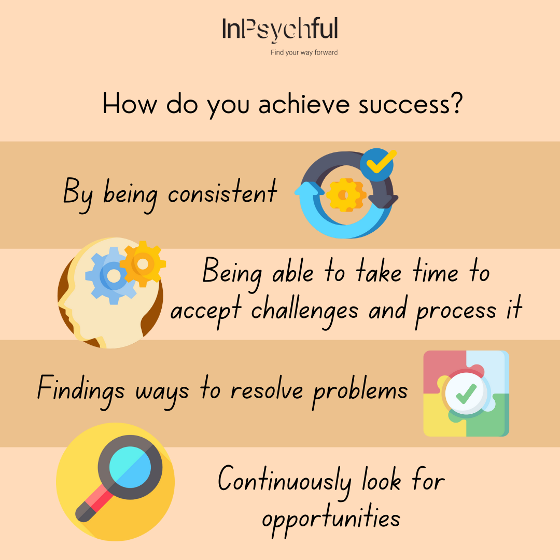“Failing academically at a young age taught me to be emotionally resilient, and that nothing is out of reach as long as I set my sights on it.”
– Camellia Wong
Hello Camellia! We would like to find out more about you, can you introduce yourself?
Hi everyone, I’m Camellia, Co-founder and Principal Psychologist at InPsychful.
What was your journey like from being an EM3 student to becoming an award-winning psychologist today?
Well… the winning of awards wasn’t part of the plan, it happened to come along during my doctoral studies in Chicago. As an Em3 kid, there were a lot of people who looked down on me. I was often told that I had no future, that I needed to work very hard to get anywhere, and basically, I’d be a nobody.
It didn’t really impact me much because all I wanted to do was play! Studying wasn’t something that interest me but dismantling things and fixing them back again was! So, I knew that I wasn’t stupid, I just wasn’t interested. But of course, when I was told that I’ll be put in EM3, it scared the daylights out of me because it’s like wow now my future is doomed. Or at least that was my initial thought, but when I started doing the work (in EM3) if found it to be super easy and I started to do well academically. That then helped me build smaller milestones for me to want to do well as I saw that I could. I began to learn to set small milestones for me to hit, and each time I got derailed from my goals I’ll that the time to think or allow myself to sit with whatever emotions that I was experiencing for a day or two, before revisiting my goals and making adjustments to them.
Thankfully, my Mum was always supportive and allowed me to take my time to grow academically and she told me at a young age that everything is in my hands and that she can’t decide for me forever. So after O levels, I took a gap year to think about what I wanted to do and that’s how I got into Psychology. Since then, aiming to be a Clinical Forensic Psychologist was the goal. So I started mapping out what was needed to get me there, and kept adding and adjusting as I went along.
How did you manage to get through your obstacles ever since you were young?
How did you manage the undercurrent message of being in a stream that is deemed as ’not on par’/ ‘less success than others’?
I think for me it was really how Mum saw me and supported me. She really allowed me to play and explore, and even told my kindergarten principal (she used to complain to my mum all the time that I wasn’t doing well in school) to just like me be a kid and play.
So when I was at the bottom of the class majority of the time, I had already experience failure and society’s judgement on my lack of academic ability. If you asked me now, I really don’t remember how I got pass that, but I’d say I chose to focus on what I was in my control. Of course I had the usual behaviours like avoiding doing homework, hid my test papers or waited until the very last minute to let my parents sign my report book. I mean, who likes to be told all the time that they’re not good at the school all the time?
That’s why I focused on what I was good at, sports and my leadership positions in Secondary school. I did exceptionally well during PSLE and managed to get into Normal Academic stream. When I started winning in sports and did well in the numerous leadership positions, I began to recognise that I had other talents even though my grades were average. So instead of spending time lamenting about why I couldn’t study, I shifted the focus to areas that I was doing well and sports was really a great outlet for me to vent my stress.
How did you achieve success?
What is success?
By being consistent. If I were to look back at my academic journey, the one thing that led me to my current success or my eventual goal of being a Psychologist was that I chose to not focus on pursuing straight As! Weird right???
Instead, I focused on what the working world requires of me instead of just paper qualification. That was when I strategically planned to take on specific internships and garnered experience that would be relevant for postgraduate studies. Guess where that brought me? I got offered for a doctoral programme that wasn’t in the plans at all! Of course I took up the offer, and when I went to the U.S., to study, I started getting As! By that time, I had uncovered my study style and what worked best for me. This was all thanks to all the experience I got outside of just purely studying.
Strategic planning is key. When I was in university, my GPA WAS STILL BAD! It was at 2.69/4! In the 2nd year I decided that well since I am not good at studying, I will just have average grades, but I’ll build a damn good CV so that that becomes my winning piece. Why? Because I spent time consulting with my lecturers or rather looking for an alternative plan knowing that my grades were bad. I noticed that all of them said the same thing, postgraduate studies isn’t all about the grades! The universities want to see that you have relevant work experience and can withstand the academic rigour that postgrad requires. They also look at other things like our personal mission statement and many other things.
That was when I found my alternative. Since I was already working and studying, so why not? I started to plan out internships that would be useful and can add on to my CV. It wasn’t easy to accept that my academics remained poor, but each time I met with a roadblock, I would allow myself time to take it in and process it but I didn’t allow myself to stay down for too long before choosing my next step. If I knew that I was feeling upset or frustrated, I’d find ways to resolve it rather than crying over spilled milk. Of course, I also had a very good social support system! So what I did was basically aimed for postgrad since year one of university and I was constantly on a lookout for internships that gave me both research and face-to-face interactions with clients. That meant that from year 2, 3, and 4, I continuously had an internship, worked full-time, and studied full-time. I was getting less than 4 hours of sleep per day (not something that I’d recommend!).
Then lo and behold, when I applied for the Masters programme in the U.S., during the interview, both interviewers asked why did I apply to the Masters programme when my CV was strong enough to pursue the Doctorate. That was when they asked if I was keen to be in a doctoral programme, and of course I said yes!
That’s inspiring! Do you have some words of advice for someone who is navigating through life or is trying to reach a goal?
Your emotions will provide you with very good insights on how you are perceiving or experiencing the situation, and it is okay to sit with those feelings for a while and process them with someone. It’s okay to feel whatever you’re feeling about the challenging situation, because you are the one living it, and no one can tell you otherwise. When you’re ready, revisit the situation or your plan/milestone/goal. Focus on what is in your control and work on it, forget about whatever that’s not in your control. Do this consistently and you’ll find that each setback may not be as big as you think it is.
Camellia Wong (M.A), Tan Khai Teng
More Articles

